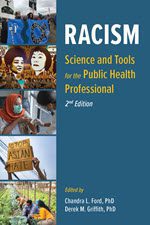
No Comments on Racism: Science and Tools for the Public Health Professional, 2nd edition 13
Racism: Science and Tools for the Public Health Professional, 2nd edition, enables public health professionals to address the health impacts of racism. This vital title resource also responds to the watershed events of the past five years: the COVID-19 pandemic and its intersection with overt forms of racism across all socioecological levels, the 2020 murder of George Floyd by Minneapolis police and the unprecedented domestic and global movements toward racial justice that transpired, and other major global events.
The chapters in this edition of Racism provide concrete, timely guidance on how to plan, develop, and implement interventions, pursue policy change, and conduct research on racism as a public health problem. Practitioners will gain a historical view of the decades-long fight for racial health equity and learn how to move beyond merely documenting inequities and toward addressing their root causes.
Like the social justice movements that characterize this era, Racism unapologetically centers on marginalized communities and calls for new approaches to public health work on racism — ones rooted not only in science, but also in empathy. This book is suitable for public health professionals, as well as professors and students.





Leave a comment